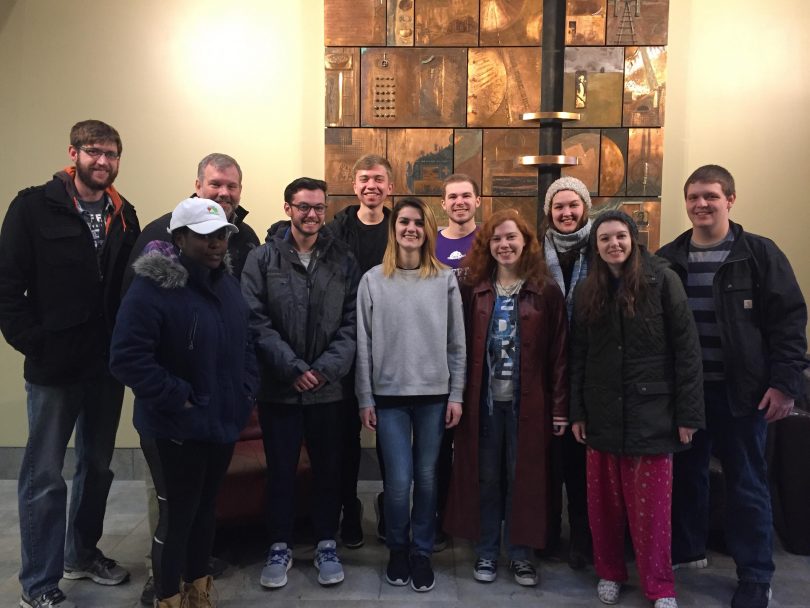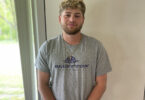WATERLOO, Ontario—For Jacob Regier, a social work major, restorative justice was something he knew little about before the Intercollegiate Peace Fellowship Conference. Regier commented how his new information has expanded his worldview by providing an alternative approach to the justice system and challenging what many of us accept as the norm.
“It was so nice to engage in hopeful conversations about visions of a society where well being and societal cooperation are more important than following the rules,” said Regier.
Ten Bluffton University students, accompanied by Dr. Alex Sider, traveled to Waterloo, Ontario, for the annual Intercollegiate Peace Fellowship Conference which focused on the meaning, history and practice of restorative justice. Conrad Grebel University College hosted the event in conjunction with its celebration of the 40th year anniversary of the Peace and Conflict Studies program.
Restorative justice, at its core, is about healing and restoring broken relationships.
It puts the victim’s needs first, holds the offender accountable for the harms they caused, while also including the communities’ role. Timothy Bender, a history and Bible and theology major, said it was good to learn about the history and practices of Restorative Justice in the region where the modern restorative justice movement emerged.
“The sessions covered a broad range of topics,” said Bender, “but the moment that stuck out to me the most was when an inmate from the Canadian prison system shared with us the importance of having different and creative approaches to how offenders are treated.”
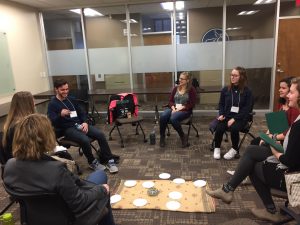
Photo by Blake Hershberger
“In her discussion of the role of prisons, she said that we shouldn’t be shocked at the outcomes of the current prison system because it’s actually not broken and works how it was set up to. Thus, if we want change, we need a different approach.”
Rowena Zuercher also appreciated the conference’s focus on stories about restorative justice.
Saying that she enjoyed “hearing from people who have made an impact, or have been impacted by restorative justice.”
“When stories are shared, experiences are worth a lot more than just the information being presented,” said Zuercher.
For Irena Xhari, a business administration major, it was intriguing to learn about the process of healing for both victims and offenders.
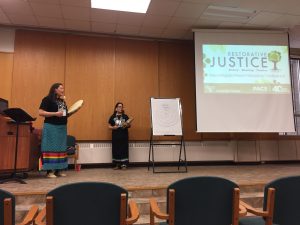
Photo by Blake Hershberger
“Our current justice system allows very little room for emotional and spiritual healing,” said Xhari. “In the process of seeing things in a bigger scale, we also analyzed the importance of applying restorative justice in our everyday relationships. Our speakers emphasized that restorative justice it’s hard to accomplish if one doesn’t start with themselves.”
By fostering restorative justice within ourselves, it can then spread to our relationships with others, eventually becoming advocators of restorative justice in our society, Xhari said.
Not only were students able to learn from the speakers, but they were able to share in conversations with other students interested in peace and justice.
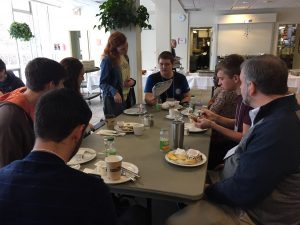
Photo by Blake Hershberger
The conference is geared toward Mennonite-affiliated colleges and universities. Many of the students who attended traveled from Eastern Mennonite University, in Harrisonburg, Va., Goshen (Indiana) College, Canadian Mennonite University, Bethel College in North Newton, Kan., and Hesston (Kan.) College.
Wyatt Bear, majoring in accounting, said it was good to meet people from other schools and hear their take and that it has given him “new perspectives on restorative justice” and that he can see it “promoting peace and bringing communities closer together.”

